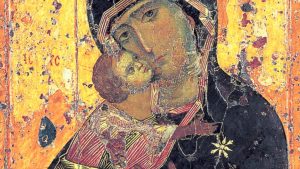 The following meditation opens an interesting question about Mary, the Mother of God (Theotokos means the bearer of God). A daughter of an Orthodox priest, Sister Vassa, a native of Nyack, NY, earned a doctorate in liturgical theology from the Pontifical Oriental Institute, Rome, now is a researcher and teacher in Vienna. She produces a the popular program, “Coffee with Sister Vassa.”
The following meditation opens an interesting question about Mary, the Mother of God (Theotokos means the bearer of God). A daughter of an Orthodox priest, Sister Vassa, a native of Nyack, NY, earned a doctorate in liturgical theology from the Pontifical Oriental Institute, Rome, now is a researcher and teacher in Vienna. She produces a the popular program, “Coffee with Sister Vassa.”
“Most Holy Theotokos, save us!” (Byzantine prayer)
What, exactly, are we asking for in this prayer? Are we calling for another human being, Mary, to “save” us, as only our One Saviour and Lord Jesus Christ can?
No. We are calling for the “Birth-Giver of God” in the flesh, the “Theo-tokos,” in Her unique ministry of bringing Him into the world, to bring us His salvation. He willed it to “save” the world in His incarnation, coming to us through Her over 2,000 years ago. And we believe in Him as in One Who continues to come to us, to “come again” and again (καὶ πάλιν ἐρχόμενον, и паки грядущаго) as the incarnate Lord.
Thus when we say, “Most Holy Theo-tokos, save us!” – and not “Mary, save us!” – we are calling also upon His name, the name of “God” incarnate, Who has brought us His salvation not without Her. We thus embrace that great mystery, of the Incarnation, when we say this today, because that mystery continues to work its salvific consequences in His One Body that is the Church. “Most Holy Theotokos, save us!” I say today, embracing His coming as He does, not only spiritually, but also physically, into holy communion with us.
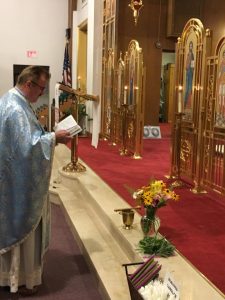 Tonight at the Divine Liturgy, Father Iura blessed herbs and flowers.
Tonight at the Divine Liturgy, Father Iura blessed herbs and flowers.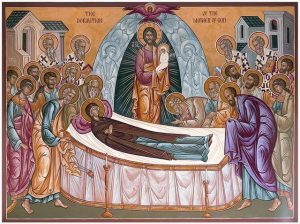 “Come, all you ends of the earth, let us praise the blessed passing of the Mother of God. She delivers her sinless soul into the hands of her Son; through her holy Dormition, the world is given new life.” (Stichera at the Litija)
“Come, all you ends of the earth, let us praise the blessed passing of the Mother of God. She delivers her sinless soul into the hands of her Son; through her holy Dormition, the world is given new life.” (Stichera at the Litija) Neither the tomb, nor death, could hold the Theotokos, who is constant in prayer and our firm hope in her intercessions. For being the Mother of Life, she was translated to life, by the One who dwelt in her virginal womb (Kontakion for the Dormition).
Neither the tomb, nor death, could hold the Theotokos, who is constant in prayer and our firm hope in her intercessions. For being the Mother of Life, she was translated to life, by the One who dwelt in her virginal womb (Kontakion for the Dormition).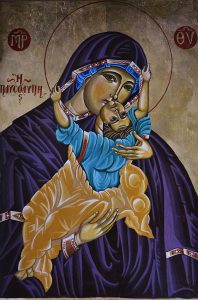 In addition to the myriad of feast days honoring Our Lady in her many titles and virtues, the entire month of May is especially given to her praise. In the words of Pope Paul VI: May is “a month which the piety of the faithful has long dedicated to Mary, the Mother of God . . . For this is the month during which Christians, in their churches and their homes, offer the Virgin Mother more fervent and loving acts of homage and veneration; and it is the month in which a greater abundance of God’s merciful gifts comes down to us from our Mother’s throne.”
In addition to the myriad of feast days honoring Our Lady in her many titles and virtues, the entire month of May is especially given to her praise. In the words of Pope Paul VI: May is “a month which the piety of the faithful has long dedicated to Mary, the Mother of God . . . For this is the month during which Christians, in their churches and their homes, offer the Virgin Mother more fervent and loving acts of homage and veneration; and it is the month in which a greater abundance of God’s merciful gifts comes down to us from our Mother’s throne.”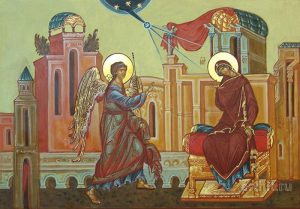 This weekend we are celebrating the mystery of our Lord’s accepting human nature for our salvation. The Archangel Gabriel asks Mary to receive God’s plan and become the mother of the Son and Word of God, to be named “Jesus,” “Savior.” Mary replies, “Behold, I am the handmaid of the Lord. May it be done to me according to your word. (Luke 1:38)” Mary’s response to God was perfect and reversed the sin of Eve. In our Lenten journey, we
This weekend we are celebrating the mystery of our Lord’s accepting human nature for our salvation. The Archangel Gabriel asks Mary to receive God’s plan and become the mother of the Son and Word of God, to be named “Jesus,” “Savior.” Mary replies, “Behold, I am the handmaid of the Lord. May it be done to me according to your word. (Luke 1:38)” Mary’s response to God was perfect and reversed the sin of Eve. In our Lenten journey, we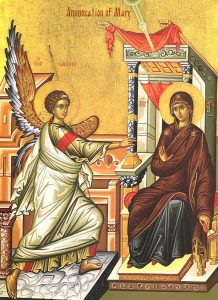 Annunciation of Mary, the Mother of God (Theotokos), March 25th
Annunciation of Mary, the Mother of God (Theotokos), March 25th The following meditation opens an interesting question about Mary, the Mother of God (Theotokos means the bearer of God). A daughter of an Orthodox priest, Sister Vassa, a native of Nyack, NY, earned a doctorate in liturgical theology from the Pontifical Oriental Institute, Rome, now is a researcher and teacher in Vienna. She produces a the popular program, “Coffee with Sister Vassa.”
The following meditation opens an interesting question about Mary, the Mother of God (Theotokos means the bearer of God). A daughter of an Orthodox priest, Sister Vassa, a native of Nyack, NY, earned a doctorate in liturgical theology from the Pontifical Oriental Institute, Rome, now is a researcher and teacher in Vienna. She produces a the popular program, “Coffee with Sister Vassa.”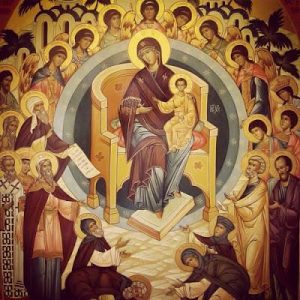 Today, the day after the Christmas feast the Byzantine Church honors Mary, the Mother of God (Theotokos) with a special feast day of remembrance.
Today, the day after the Christmas feast the Byzantine Church honors Mary, the Mother of God (Theotokos) with a special feast day of remembrance.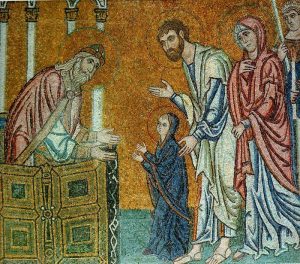 “The most pure Temple of the Savior; / the precious Chamber and Virgin; / the sacred Treasure of the glory of God, / is led today into the house of the Lord. / She brings with her the grace of the Spirit, / therefore, the angels of God praise her: / ‘Truly this woman is the abode of heaven.’” (Kontakion-Hymn of the Entry of the Theotokos into the Temple)
“The most pure Temple of the Savior; / the precious Chamber and Virgin; / the sacred Treasure of the glory of God, / is led today into the house of the Lord. / She brings with her the grace of the Spirit, / therefore, the angels of God praise her: / ‘Truly this woman is the abode of heaven.’” (Kontakion-Hymn of the Entry of the Theotokos into the Temple)